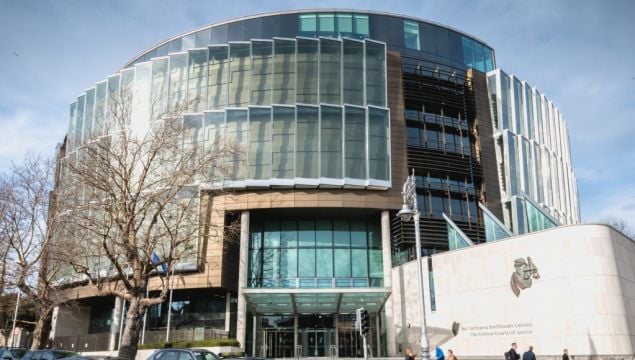The trial of a man accused of murder on Dublin's O'Connell Street has collapsed after one of the jurors believed they overheard gardaí discussing witness statements in the courtroom.
Prosecution counsel told the court that gardai "absolutely did not discuss witness statements" in the courtroom but submitted that the jury should be discharged due to the impression formed by them that one of their members had overheard discussion.
The trial of Damien Singleton (30), who is accused of the murder of father-of-one Peter Donnelly on O'Connell Street in the capital in June 2019, began on Monday in Court 9 at the Central Criminal Court (CCJ) before Ms Justice Tara Burns.
At the start of the trial, Mr Singleton, of no fixed abode, pleaded not guilty to the murder of his friend, Mr Donnelly, but pleaded guilty to the charge of manslaughter.
Stabbing injuries
The court had been told by Assistant State Pathologist Dr Margot Bolster that Mr Donnelly (39), who was originally from Kilkenny, died due to stabbing injuries inflicted upon him in the early hours of June 11, 2019.
The court had viewed CCTV footage that showed a male, Mr Donnelly, being stabbed three times and struck with a bottle as he fell by another male, who then ran away.
Before the Central Criminal Court trial got underway on Friday, the jury foreman passed a note to Ms Justice Burns raising issues on behalf of jurors who had difficulty in hearing the witnesses in the case. However, the note also said that, "worryingly", a juror said he believed he overheard partial conversations between gardaí about witness statements.
The note was received by the judge and the jury was given a break for it to be read to counsel for the prosecution and defence.
Ms Justice Burns said that the note raised issues with jurors who were seated to the rear of the court hearing witness evidence, but the note also added that there was no need to recall witnesses.
Mobile phone distractions
The judge said that jurors also felt that there were mobile phone distractions, and that each juror not situated in the jury box, due to health and safety protocols, had difficulties hearing witnesses.
The case had been held in the smaller Court 9 in the CCJ, where under health and safety guidelines due to the Covid-19 outbreak, six jurors were allocated seating in the jury box, which usually seats 12, while the other six jurors were seated in the body of the court.
The note to the judge also read that "chatting" in the body of the court distracted jurors and that "gardaí were partially heard in the position behind [defence counsel] discussing witness statements" and that this was also the "worst spot" for distraction due to people grouped there.
Prosecution counsel, Lorcan Staines SC, said there were only two gardaí permanently present in the court for "logistical reasons" and that they "absolutely did not discuss witness statements". He said however that they possibly discussed witness attendance, as they were witness and evidence managers in the case.
Impression formed
Mr Staines said the problem raised by the jury's note was that the impression had now been formed within the jury that one of their members believed he heard gardaí discuss witness statements. This concern was recorded as "worryingly" present for the jury.
Mr Staines said that two gardaí present in the court for the trial were not witnesses and had not been involved in the investigation.
However, Mr Staines said this impression formed by the jury meant that they should be discharged.
Ms Justice Burns said that the situation was "very unfortunate" and that a juror was "not [sitting] in a good position" for the trial. She added that she had "concerns" about the seating allocation for jurors in the courtroom.
No impropriety implied
Defending barrister Michael Bowman SC and Mr Staines said there was no impropriety implied in relation to the gardaí present in the trial, with Mr Bowman adding that the gardaí in the case were "a model of professionalism".
When the jury of eight men and four women was recalled by Ms Justice Burns, she told them that "unfortunately" they would have to be discharged.
Ms Justice Burns thanked the jury for bringing their issues to her but said that she had been keeping an eye out for any juror to alert her to difficulties hearing witnesses during the trial, which had not occurred.
Ms Justice Burns said that the courts were doing their best in terms of logistical arrangements for jurors in trials and that a number of different situations had been tried out for juries, in the context of health and safety during the pandemic.
The judge said that the issues raised by the jury would now be passed on to the Courts Service for consideration.
Ms Justice Burns said that she, the prosecution and the defence found it "very concerning" that a juror said they believed they overheard gardaí discussing witness statements.

The judge said that it was an "extremely unsatisfactory" situation for all concerned that the jury had to be discharged and noted that the prosecution were "very close to a close" in the case.
Ms Justice Burns said, in light of the concerns raised, that she, the prosecution and the defence all believed that it would be inappropriate for the jury to continue.
Ms Justice Burns then thanked the jury for their time and said she was sorry the situation had arisen.
Ms Justice Burns fixed Monday of next week for the case to be re-listed for mention.







